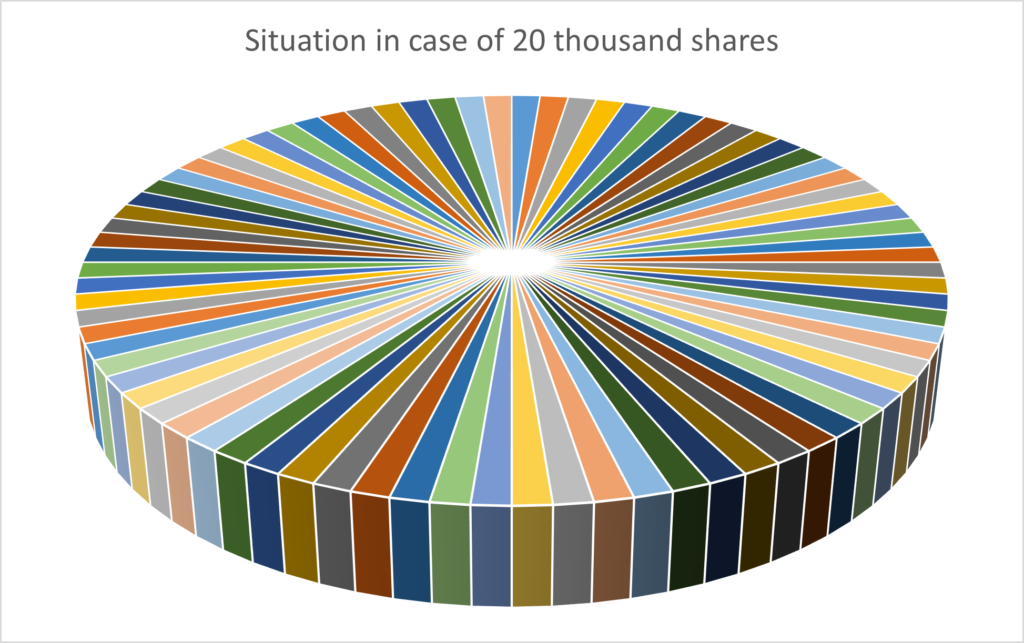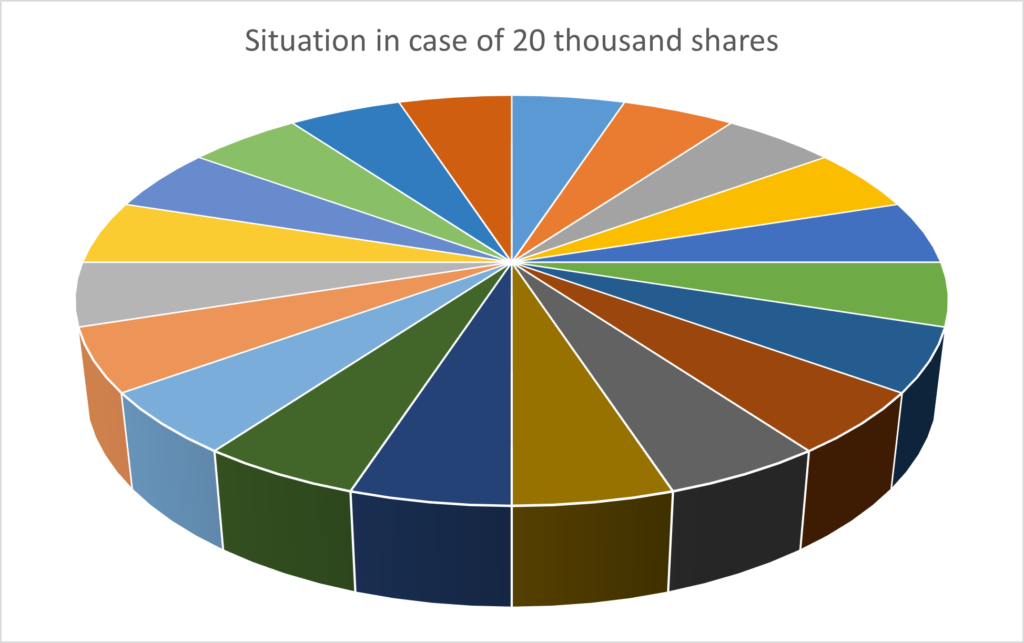Real estate tokenization – Sales of 20 thousand shares of the most expensive apartment in Poland at 44 Złota Street
Publication date: April 15, 2024
Facts

At the beginning of 2024, the residents of the luxurious Złota 44 skyscraper were surprised with the information when the owner of the most expensive apartment presented an innovative idea called “Epic Flip”. The “epic flip” involves dividing an apartment worth PLN 23 million into 20,000 shares and selling them using tokenization technology. Each share will be available for PLN 5,000, $bigSB 777 or 504 NFT AIRdrop for all interested parties. The order of sale will be determined based on records and the originality of the motivation to purchase the share. There is no limit to the number of shares that can be acquired by individuals, but companies must have at least 10 shares. The owner reports that over 6,572 people have expressed interest in purchasing over 48,954 shares. The owner of the apartment was the first in Poland to use the tokenization mechanism in the context of real estate, thanks to which the purchase of a share in the apartment became available to a larger number of investors. Tokenization makes it possible to divide the value of real estate into digital tokens that can later be sold individually, which is completely different from the traditional real estate market, where transactions involve the transfer of entire rights to the premises. The owner responded to allegations regarding legal issues, claiming that the transaction is legal and regulated mainly by the section of the Act of April 23, 1964, Civil Code (uniform text: Journal of Laws of 2023, item 1610, as amended) regarding co-ownership. The owner also emphasized that the main goal of the project is to test the social reaction to the innovative model of co-ownership. Another practical problem is the issue of entering so many owners in the land and mortgage register, which may take years. One solution is for smaller shareholders to send proxies, but this may cause additional problems. Finding a notary who will undertake such an operation can also be a challenge, requiring a lot of time and effort.

The above chart illustrates the relationship between the number of shares and the value of the entire property. One fragment of the circle (1,000 shares) is worth PLN 5 million. From this it is easy to conclude that the more shares, the greater the profit for the owner. Even though the owner describes his initiative as a “social experiment”, it seems more focused on making profits than on market research, as the apartment owner suggests. Although the number of shares is related to the amount of rent, which is PLN 20,000 PLN per month, assuming that each buyer of the share would pay PLN 1 per month, the division of the property into 5 or 10 thousand shares would be enough to conduct this “social experiment”. However, such a division would not guarantee the high profits desired by the owner.
If the property owner wanted to maintain the sales price of the premises despite reducing the number of shares, the arrangement would be as follows:

In the above situation, reducing the number of shares would result in an increase in the value of one share, which could reduce the attractiveness of the investment for a large group of people. Assuming the popularity of the property owner, many shareholders may be the businessman’s fans, who are mainly private individuals. Even though the owner directs his “experiment” rather to large companies that can afford to buy more shares, the lack of these smaller shareholders may result in the failure of the project. The existence of high interest in purchasing shares may also lead to unpredictable consequences for apartment 504 and the common area of Złota 44. This includes the community’s concerns about allowing a large number of people to use the apartment, given that in accordance with construction law and safety regulations the apartment may accommodate up to 300 people at the same time. Probably most of the potential shareholders are mainly interested in possible profits, and not in the stay in the apartment itself, so the possibility of over 300 people staying in the apartment at the same time is negligible.
Sale of the apartment in the form of NFT tokens
Tokenization of the apartment at Złota 44 is the first case of this type on the Polish real estate market. However, in countries such as the USA or Singapore, selling real estate in the form of NFT tokens is already practiced. NFTs are a type of digital collectible goods based on blockchain technology. Each token has a unique serial number, confirming its authenticity and exclusive ownership. Thanks to NFTs, it is possible to “tokenize” various assets, including real estate. The sale of apartments in the form of NFT tokens makes it possible to purchase them even for people with limited capital. Importantly, such digital real estate shares can be easily resold without intermediaries. Nevertheless, there is currently no regulation regarding NFTs on the Polish real estate market, which is why the project in question can be considered pioneering.
Tokenization has its advantages – it potentially increases the liquidity of the real estate market and makes it more transparent. However, there are also legal questions that remain unresolved. One of the problems is the management of such a property. Nevertheless, a positive aspect is the greater accessibility and transparency of such a market.
Property law – regulations regarding joint ownership
The basis for regulations regarding co-ownership of real estate are the provisions of Chapter IV of the Civil Code (Articles 195-221). In accordance with the definition contained in Art. 195 of the Civil Code, joint ownership of real estate occurs when several people have an undivided right to a given real estate. This means that one property can be jointly owned by many people at the same time, which was noticed by the initiator of the “Epic Flip”.
Article 196 § 1 of the Civil Code distinguishes two types of co-ownership: fractional and total. In the case of joint ownership, the proportion of shares of individual co-owners is not determined. However, fractional co-ownership means that each co-owner has a specific fraction of the share in the property, but there is no physical division of the property. Based on the facts presented and the owner’s statements, it can be concluded that we are talking about fractional co-ownership.
Rules for managing a co-owned apartment
Pursuant to the provisions of Art. 198 of the Civil Code, each co-owner has the right to dispose of his or her share in the property without the need to obtain the consent of the other co-owners. However, this provision regulates these rights in such a way that they do not violate the rights of other co-owners. In case of taking actions that go beyond the scope of ordinary management, such as selling the apartment, putting it to use by a third party, establishing an easement or building on a property covered by joint ownership, it is necessary to obtain the consent of all co-owners. If the remaining co-owners do not consent to actions going beyond the scope of ordinary management, persons whose shares constitute at least half may apply to the court to resolve the matter. The court takes into account the purpose of the intended action and the interests of all co-owners (Article 199 of the Civil Code), but such a process may be lengthy and generate additional costs.
When it comes to issues related to the ordinary management of a common property, i.e. using the property, deriving benefits from it and maintaining it in proper condition, the consent of the majority of co-owners is required. If this consent is not obtained, each of them may apply to the court for permission to take a specific action.
Additionally, each co-owner has the right to make the so-called conservative actions that serve to maintain common law. Pursuant to Art. 209 of the Civil Code, they may cover all actions and claims aimed at protecting common law. For example, each of them may demand payment of outstanding rent or bring an action for the return of the property in the event of its unlawful occupation by a third party. As a result, each co-owner may act to protect the common law, in accordance with the provisions of the Civil Code.
Rights and obligations of co-owners of the apartment
While considering the issue of co-ownership, the legislator also created regulations related to the rights and obligations of co-owners, the content of which is based on Art. 207 of the Civil Code. According to it, profits and other income from a common property are allocated to the co-owners in proportion to the size of their shares. In the same proportion, co-owners bear the expenses and burdens related to the common property.
Taking into account the above, it should be concluded that each co-owner has both the right to share in the income generated by the property and the obligation to maintain it properly. Consequently, each of the co-owners, depending on their share, is obliged to participate in the renovation of elements such as walls, floors and doors to the apartment.
Quoad usum – agreement on the division of real estate for use
The Latin legal paremia, mentioned many times in several interviews by the owner of the property in question, was to play a key role in the entire project. So what is it about?
The quoad usum agreement allows for the separation of part of the property for the exclusive use of one of the co-owners. In practice, this means that all or only selected co-owners have the right to use a specific part of the property, excluding other co-owners. Under this agreement, the co-owner may independently use, use and benefit from a physically separated part of the property, as well as bear the related operating costs. If there is a need to renovate this part of the property, the costs will be borne by the co-owner. The form of the quoad usum agreement may vary – it may be concluded in writing, oral or even implied. The division of quoad usum may also result from a court decision. If all co-owners do not consent to such an agreement, those who hold more than half of the shares may apply to the court to determine the division. It is worth noting that the fact that one of the co-owners has a 10% share in the property does not automatically mean that under the quoad usum agreement he will receive 10% of a specific part of the property for exclusive use.
Potential sad end of ‘social experiment’
The housing community of Złota 44 emphasized that, in accordance with the provisions and regulations, it is impossible for the premises to be used by several thousand people at the same time without negative consequences for them, the building, its residents and the community’s activities. Additionally, it was emphasized that in the event of long-term arrears with payments or gross violation of domestic order by the owner, the Housing Association has the right to demand a compulsory auction of the premises on the basis of the provisions of the Code of Civil Procedure.
Therefore, the Management Board of the Community put to a vote a resolution to file a lawsuit against the owner of the property for the purpose of compulsory auction of his premises. Only 1.26% of the shares entitled to vote voted against this resolution.
